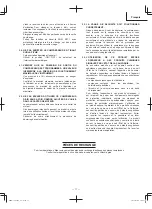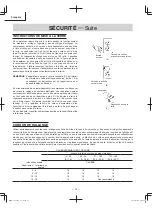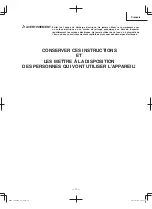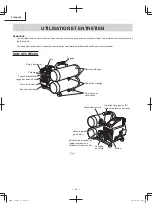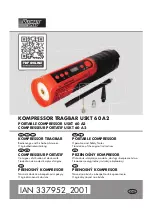
English
— 5 —
16. CHECK DAMAGED PARTS AND AIR LEAK.
Before further use of the compressor, a guard or other part
is damaged should be carefully checked to determine that
it will operate properly and perform its intended function.
Check for alignment of moving parts, binding of moving
parts, breakage of parts, mounting, air leak, and any other
conditions that may a
ff
ect its operation.
A guard or other part that is damaged should be properly
repaired or replaced by an authorized service center unless
otherwise indicated elsewhere in this Instruction Manual.
Have defective pressure switches replaced by authorized
service center.
Do not use compressor if switch does not turn it on and o
ff
.
17. NEVER USE COMPRESSOR FOR APPLICATIONS
OTHER THAN THOSE SPECIFIED.
Never use compressor for applications other than those
speci
fi
ed in the Instruction Manual.
Never use compressed air for breathing or respiration.
18. HANDLE COMPRESSOR CORRECTLY.
Operate the compressor according to the instructions
provided herein. Never allow the compressor to be
operated by children, individuals unfamiliar with its
operation or unauthorized personnel.
19. KEEP ALL SCREWS, BOLTS AND COVERS TIGHTLY
IN PLACE.
Keep all screws, bolts, and covers tightly mounted. Check
their conditions periodically.
20. KEEP MOTOR AIR VENT CLEAN.
The motor air vent must be kept clean so that air can freely
fl
ow at all times. Check for dust build-up frequently.
21. OPERATE COMPRESSOR AT THE RATED VOLTAGE.
Operate the compressor at voltages speci
fi
ed on their
nameplates.
If using the compressor at a higher voltage than the rated
voltage, it will result in abnormally fast motor revolution and
may damage the unit and burn out the motor.
22. NEVER USE A COMPRESSOR WHICH IS DEFECTIVE
OR OPERATING ABNORMALLY.
If the compressor appears to be operating unusually,
making strange noises or vibration, or otherwise appears
defective, stop using it immediately and arrange for repairs
by a Hitachi authorized service center.
23. DO NOT WIPE PLASTIC PARTS WITH SOLVENT.
Solvents such as gasoline, thinner, benzine, carbon
tetrachloride, and alcohol may damage and crack plastic
parts. Do not wipe them with such solvents.
Wipe plastic parts with a soft cloth lightly dampened with
soapy water and dry thoroughly.
24. USE ONLY GENUINE HITACHI REPLACEMENT PARTS.
Replacement parts not manufactured by Hitachi may void
your warranty and can lead to malfunction and resulting
injuries. Genuine Hitachi parts are available from your
dealer.
25. DO NOT MODIFY THE COMPRESSOR.
Do not modify the compressor. Do not operate at pressure
or speed in excess of manufacture’s recommendations.
Always contact the Hitachi authorized service center any
repairs. Unauthorized modi
fi
cation may not only impair the
compressor performance but may also result in accident
or injury to repair personnel who do not have the required
knowledge and technical expertise to perform the repair
operations correctly.
26. PUSH THE KNOB OF PRESSURE SWITCH TO “OFF”
WHEN THE COMPRESSOR IS NOT USED.
When the compressor is not used, push the knob of
the pressure switch to “OFF”, disconnect it from the
power source and open the drain cock to discharge the
compressed air from the air tank.
27. NEVER TOUCH HOT SURFACE.
To reduce the risk of burns, do not touch infeed pipe,
head, cylinder, carter cover and motor.
These areas can remain hot for at least 45 minutes after
this compressor is shutdown.
Allow compressor to cool prior to servicing.
28. DO NOT DIRECT AIR STREAM AT BODY.
Risk of injury.
Do not direct air stream at persons or
animals.
29. DRAIN TANK.
Risk of bursting. Water will condense in the air tank. If
not drained, water will corrode and weaken the air tank
causing a risk of air tank rupture.
Drain tank daily or after 4 hours of use. To drain the air
tank, open valves slowly and tilt compressor to empty
accumulated water.
Keep face and the other body parts away from outlet of
drain.
Use ANSI Z87.1 safety glasses with side shields when
draining as debris can be kicked up into face.
30. DO NOT STOP COMPRESSOR BY PULLING OUT THE
PLUG.
This could result in damage to the unit.
Use the “ON/OFF” knob of pressure switch.
31. MAKE SURE THE COMPRESSOR OUTLET PRESSURE
IS SET LOWER THAN THE MAXIMUM OPERATING
PRESSURE OF THE TOOL.
Too much air pressure causes a hazardous risk of
bursting.
Check the manufacturer’s maximum pressure rating for air
tools and accessories. The regulator outlet pressure must
never exceed the maximum pressure rating.
32. DO NOT ATTEMPT TO OPERATE THIS COMPRESSOR
WITHOUT FIRST ADDING OIL TO THE CRANKCASE.
The compressor is shipped without oil in the crankcase.
Serious damage can result from even limited operation
unless
fi
lled with oil and broken in correctly.
Make sure to closely follow initial set-up prior to operation
procedures.
000Book̲EC99S̲lowes.indb 5
000Book̲EC99S̲lowes.indb 5
2018/03/09 10:49:28
2018/03/09 10:49:28

















